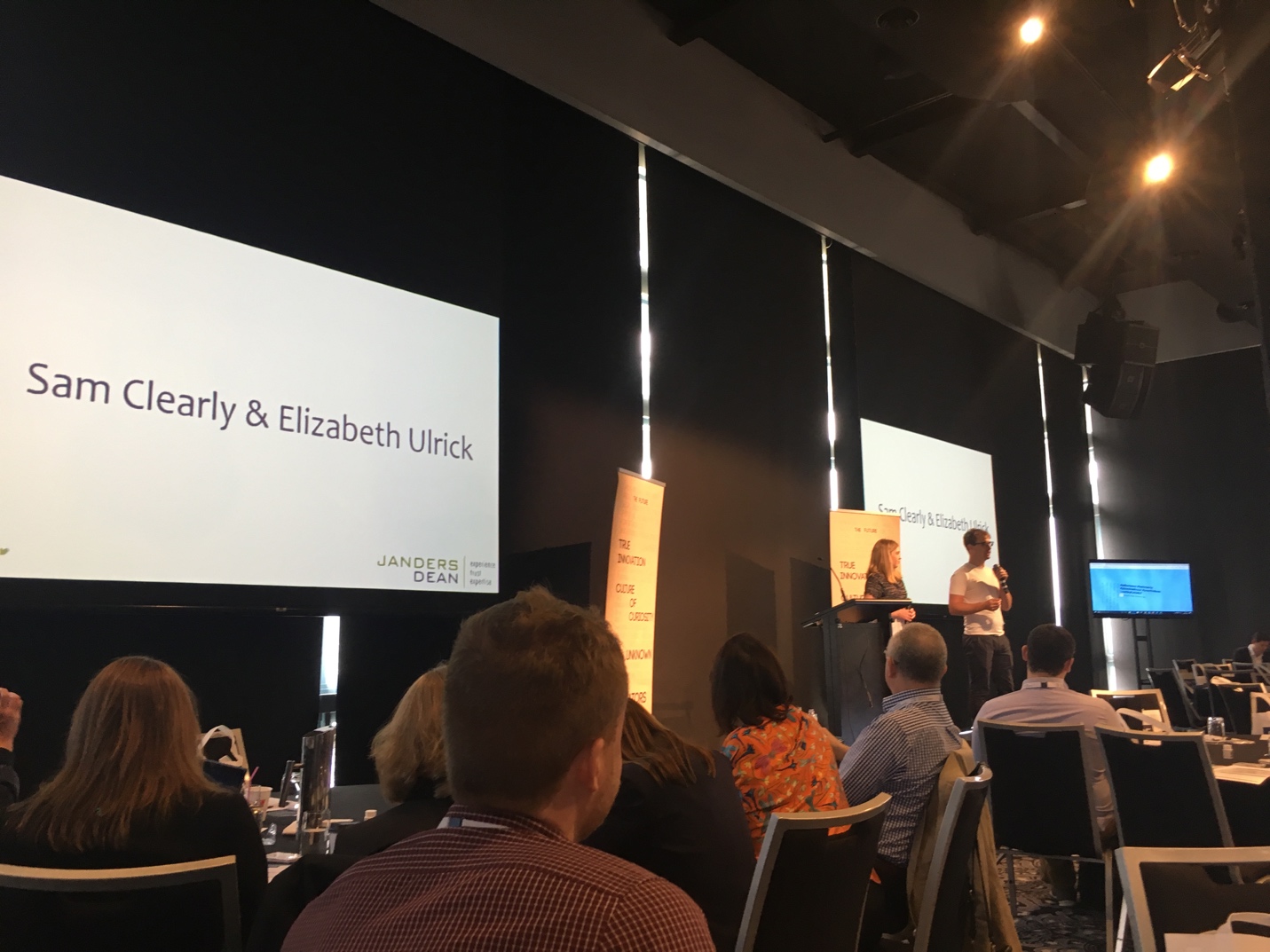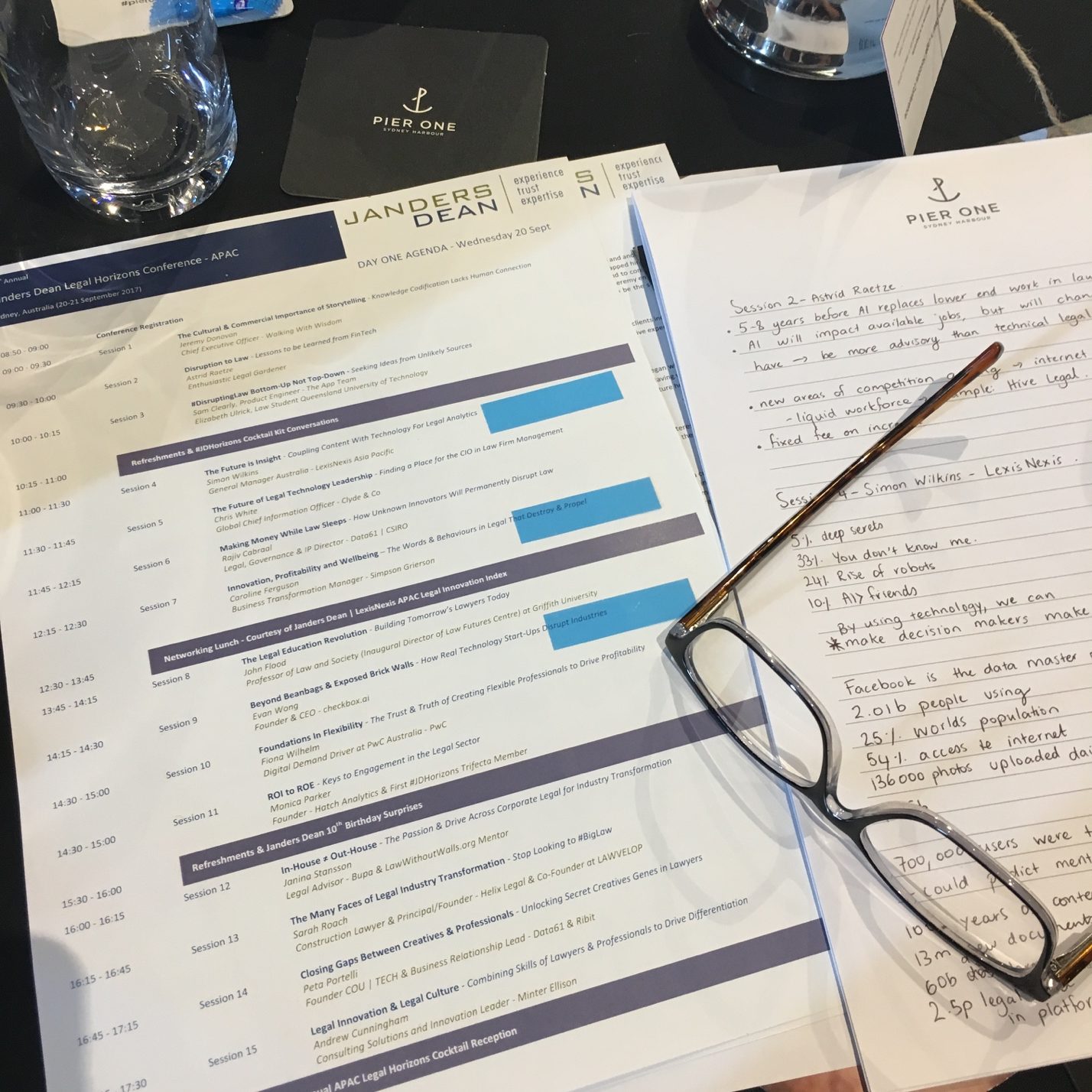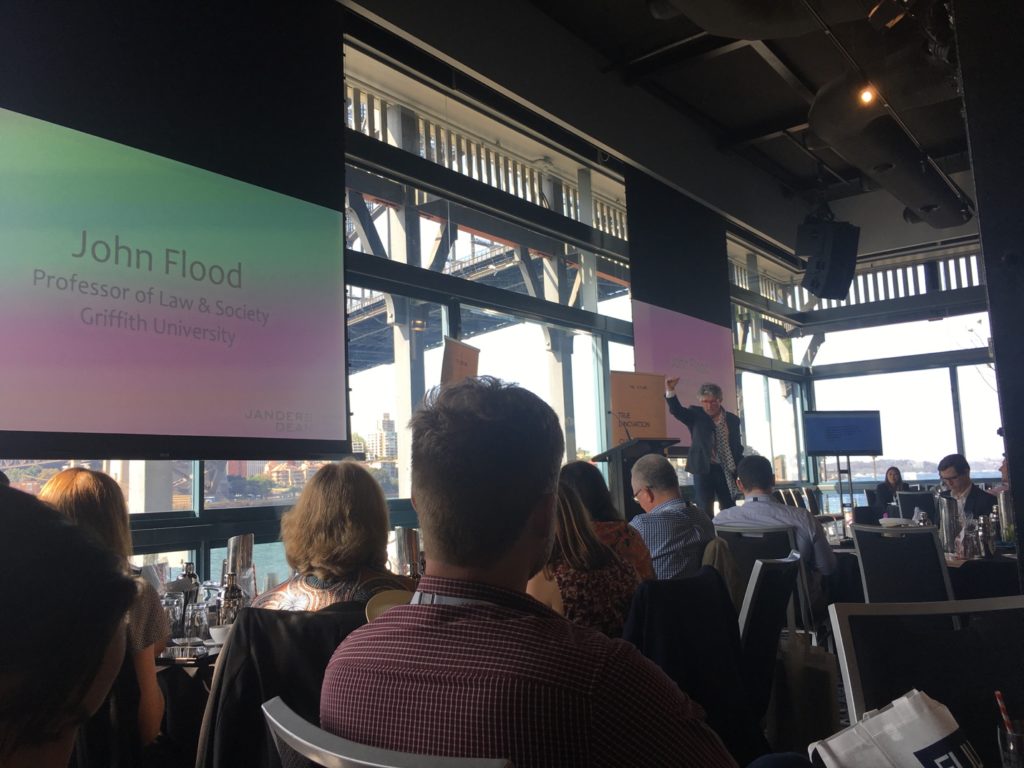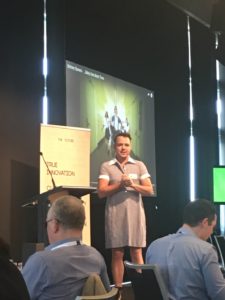JD Legal Horizons Conference Review
Janders Dean Legal Horizons Conference 2017
Review by Josephine Bird (TLF QLD)
On the 20th of September, The Legal Forecast headed to Sydney for the Janders Dean Legal Horizons Conference, 2017. We had the chance to listen to and engage with legal and tech professionals from around the world, all of whom are dedicated to legal innovation. We were also lucky enough to watch two previous Disrupting Law contestants, Sam Cleary and Liz Ulrich, give a presentation on their journey after Disrupting Law 2017. We therefore thought it important to provide a recap of what we learnt over the two day conference.
#1 - Storytelling is important in driving disruption
The conference was opened with a message that lies at the heart of what the JD horizons conference was all about, being that we must ‘disrupt our norm’. Jeremy Donovan from Walking With Wisdom spoke with passion and sincerity about how his background could have entrapped him into a life of insignificance, however, by challenging the life he’d always known, he was able to create change. Jeremy now travels the world sharing his stories and empowering others to make changes in their lives. We believe that this sentiment can be applied to the legal profession, in that by sharing our stories and struggles, we can drive connectedness, create change, and empower each other to achieve our potential. #2 - Big data and legal analytic tools are on the riseBeth Patterson, Chief Legal & Technology Services Officer of Allens explained that 90 % of the world’s existing data has been created in the past two years. The legal profession creates an ever-increasing amount of data - being judicial rulings, precedents and interpretations. Innovation around the way in which law firms use big data sets is imperative to efficiency of future practice and delivering legal work at scale. General Manager of LexisNexis, Simon Wilkins, explained that big data is and will be increasingly important in improving client service and performance. Lawyers can employ analytics to structure these data sets to extract the most relevant information pertaining to their case. Simon drew links to Facebook, who he described as the ‘data master of the world’, producing approximately 4.75 billion pieces of content per day.At the beginning of this year, Facebook conducted a study wherein it manipulated content published on approximately 700,000 users newsfeeds to determine how users respond to positive and negative content. Ethical issues aside, the use of big data in this way could work to predict mental illness in Facebook users. Simon posed the question: how do you stay on top of data when you have so much of it? This is where artificial intelligence comes in. Data driven systems can employ learning algorithms to decipher and analyse big data sets. Such as predicting mental illness in Facebook users, the use of probability analysis of past precedent can assist in predicting percentage of success in current cases.
#2 - Big data and legal analytic tools are on the riseBeth Patterson, Chief Legal & Technology Services Officer of Allens explained that 90 % of the world’s existing data has been created in the past two years. The legal profession creates an ever-increasing amount of data - being judicial rulings, precedents and interpretations. Innovation around the way in which law firms use big data sets is imperative to efficiency of future practice and delivering legal work at scale. General Manager of LexisNexis, Simon Wilkins, explained that big data is and will be increasingly important in improving client service and performance. Lawyers can employ analytics to structure these data sets to extract the most relevant information pertaining to their case. Simon drew links to Facebook, who he described as the ‘data master of the world’, producing approximately 4.75 billion pieces of content per day.At the beginning of this year, Facebook conducted a study wherein it manipulated content published on approximately 700,000 users newsfeeds to determine how users respond to positive and negative content. Ethical issues aside, the use of big data in this way could work to predict mental illness in Facebook users. Simon posed the question: how do you stay on top of data when you have so much of it? This is where artificial intelligence comes in. Data driven systems can employ learning algorithms to decipher and analyse big data sets. Such as predicting mental illness in Facebook users, the use of probability analysis of past precedent can assist in predicting percentage of success in current cases.
#3 - AI is the future
The increase in research around artificial intelligence processes and use of algorithms to analyse big data is not a new phenomenon, and the idea that AI is the future of the legal profession is not an entirely new lesson to learn. However, what we learnt about how AI will affect our futures provided us insight in regards to how law students and lawyers can engage and interact with technology moving forward.AI can be a difficult topic to grasp, and is notoriously difficult to define. Tax Technology & Innovation Manager of KPMG, Peter Xing, explained AI in it’s broadest term as applying to any technique that enables computers to mimic human intelligence using logic and rules. Beth Patterson (Allens) also identified three arms of AI which will have/are having a major impact on the legal industry: speech recognition, natural language processing, and machine learning.Global FinTech leader, Astrid Raetze, discussed the reality that it is approximately 5-8 years before AI replaces lower end work in law firms. The increased use of AI will impact available jobs, yes. However, it will also change the types of roles we have, being more advisory than technical legal work. With liquid workforces like Hive Legal and new areas of competition arising (i.e. internet based legal services), lawyers need to learn to adapt. The conference bought with it recurring themes of lawyers needing to be tech savvy, and the reality that technology literate firms are moving forward. Should lawyers and law students therefore learn to code? Not necessarily, but it’s clear that knowledge of this type of technology is becoming increasingly critical in order to deliver great solutions to clients. 
#4 - Don’t fear the rise of technology, embrace it
Digital disruption is not new, but it’s at a point where it can be applied in a meaning way in order to democratise access to law. Rajiv Cabraal of Data61 quoted Richard Susskind’s three drivers for change, being (1) cost pressure; (2) liberalism; and (3) technology. On this, he explained that adhering to red tape currently carries a staggering $250 billion annual cost - an issue that Rajiv and the team at Data61 are working to change by creating applications that cut through these dense regulations. Rajiv believes that legal and regulation tech are industries that will thrive from digital disruption, and in his own words, must “wake up and innovate”!Founder and CEO of checkbox.ai, Evan Wong, posed the question: what can’t be automated? Artificial Intelligence is a rule based system and can only automate structured work. Unstructured work that requires creativity, human interaction and value judgements doesn’t lend itself to computerisation, therefore lawyers should see the rise of technology as an opportunity to spend more time on this ‘meaningful’ aspect of law, rather than boring and mundane tasks. In this way, we learnt that the increased use of technology will allow decision makers to make better decisions. Uncertainty is not a threat, it’s an opportunity.
#5 - Innovation should also be a human endeavour
It was incredibly eye opening to hear that 95% of people within the legal profession suffer from ‘extreme stress’. Caroline Ferguson of Simpson Grierson in Auckland gave us an insightful talk about mental health in the legal industry and the importance of considering lawyer well being in the context of driving innovation. Caroline emphasised that we need to harness people’s struggles to encourage the entire legal profession to have more conversations. It’s important for senior lawyers and partners to share their journey in order to show law students and young professionals that they are not the only one’s who have struggled with stress and mental illness. Caroline’s words were incredibly empowering and with mental health being an ever-increasing issue, it’s important we share our stories and keep the conversation going. Education and awareness is important in creating more human focused businesses.
#6 - Creativity and culture are key to innovation
Chief Product & Strategy Officer of HighQ, Stuart Barr, expressed a similar sentiment to Caroline Ferguson, in that innovation isn't just about technology. People drive innovation, therefore allowing people to be creative leads to innovation and the competitive edge that law firms are all trying to achieve. On this, it’s imperative that law firms strive to create a culture in which their employees can actually be creative. Janina Stansson, Senior Lawyer at BUPA, spoke about the work the legal sector of BUPA is doing in order encourage and leverage design thinking, allowing employees to be their genuine selves at work. Janina believes that leaders must not take themselves too seriously, and that law firms need to ‘harness the power of the millennial brain’ when driving creativity and culture.Monica Parker, founder of Hatch Analytics, drove home this point with the statistic that 94% of lawyers say the more meaning their job has, the more likely they are to be engaged. Monica also spoke about the need for lawyers to communicate more in order to drive connectedness, which in turn will highly benefit business practices as well. She provided a surprising (but also not so surprising) statistic that 71% of lawyers will not take the time to think during the day in fear of being seen as ‘slacking off’ during work hours. Sarah Roach, founder and director of Helix Legal, summarised this lesson perfectly with the statement that ‘innovation must be aligned with employee metrics and creating a good environment!’
#7 - Change happens because we demand it
Morgan Koegel, CEO of One Girl, gave an unbelievably inspiring presentation on the work that One Girl does, bringing education to girls in Africa. Morgan believes that knowledge is the spark that can change the world we live in for the better, and that in order to see change happen, we must demand it and work toward it as a team. In order for the legal profession to grow, we must help drive and the support the change that we demand. Overall, the JD horizons conference was an incredible experience! Thank you to each of the speakers over the two day period who left us with thought provoking and inspiring advice that we can apply to our futures within the legal profession. We would especially like to thank Justin North and the team from Janders Dean for the wonderful opportunity to be involved. We never thought a conference could be as inspiring as it was fun, but you managed to pull it off! If you would like to be interviewed or offer your thoughts on a recent event, book or article, please contact our Editor In Chief, Michael Bidwell, at mbidwell@mccullough.com.au
Overall, the JD horizons conference was an incredible experience! Thank you to each of the speakers over the two day period who left us with thought provoking and inspiring advice that we can apply to our futures within the legal profession. We would especially like to thank Justin North and the team from Janders Dean for the wonderful opportunity to be involved. We never thought a conference could be as inspiring as it was fun, but you managed to pull it off! If you would like to be interviewed or offer your thoughts on a recent event, book or article, please contact our Editor In Chief, Michael Bidwell, at mbidwell@mccullough.com.au
